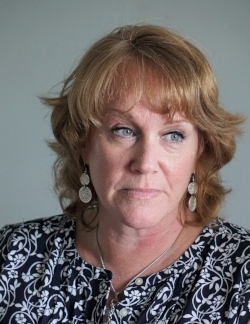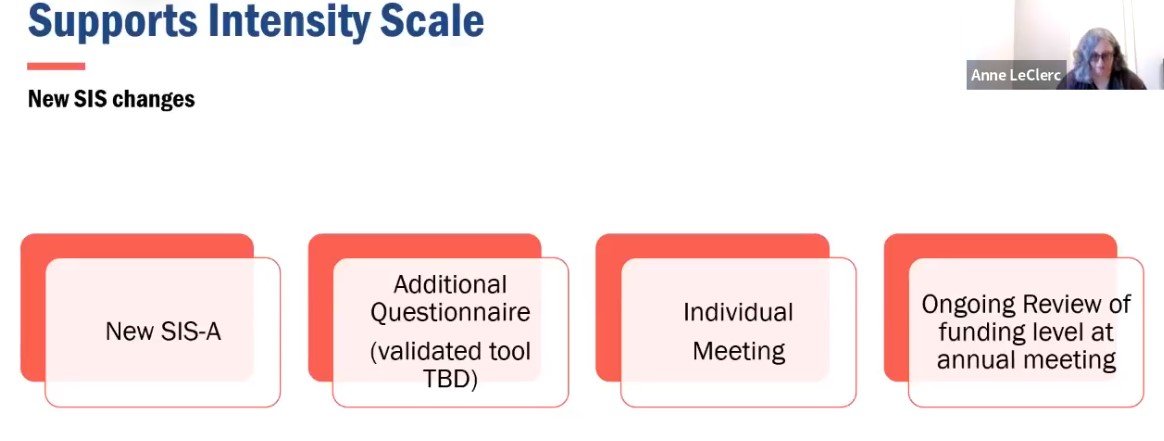'Day Of Action' Planned At RI State House To Raise Disability Awareness - And Alarms About Budget
/By Gina Macris
Developmental Disabilities Awareness Month, celebrated across the nation, will come to the Rhode Island State House in a “Day of Action” Thursday, March 29.
Adults who face intellectual challenges in daily living plan to celebrate their accomplishments. But they and their supporters also want to raise an alarm about the damage they say proposed budget cuts will cause to the services they need to live full lives.
The “Day of Action” is aimed at lobbying legislators over what advocates say is a looming crisis. Late in the afternoon, after the House adjourns, a subcommittee of the House Finance Committee is scheduled to hear Governor Gina Raimondo’s budget proposal.
The budget would eliminate $18.4 million in current costs from the private service system that supports most adults with developmental disabilities in Rhode Island, says Donna Martin, executive director of the Community Provider Network of Rhode Island (CPNRI), sponsor of the “Day of Action. “
On Thursday evening, Advocates in Action will host a meeting in Warwick that will feature adults with developmental disabilities encouraging their peers to speak up for their right to individualized services that is embedded in the Americans With Disabilities Act (ADA). (Read related article here.)
The individualized approach is inherently costlier than the congregate care Rhode Island has depended on in the past in sheltered workshops and day centers.
But the right to individual choice is mandated by the state’s 2014 Olmstead consent decree with the U.S. Department of Justice. And the judge in the case, John J. McConnell, Jr. of U.S. District Court, has signaled from the bench that he will be watching budget deliberations.
Among service providers, some officials say privately that their agencies are teetering on the brink of insolvency as a result of several years of underfunding in which the state has failed to cover their costs and they’ve exhausted any reserves they might have had.
The budget, if enacted, would be “untenable,” said the CEO of one service agency, who asked not to be identified publicly.
Family members say the issue is not just about the service agencies.
David and Marcia Graves, parents of a woman with cerebral palsy, said in a statement that the spending cuts “will put the emotional and physical well-being of our daughter and others in jeopardy.”
A drastically reduced budget would make the difficult job of recruiting and retaining qualified direct care workers impossible, the Graveses said in a statement released by the CPNRI.
Raimondo’s calculations suggest that the governor’s office and the developmental disabilities agency, BHDDH, are not reading from the same page of figures.
Martin, the executive director of CPNRI, put it another way. She said that Raimondo’s budget, like the proposals of governors before her, does not address a structural deficit in developmental disabilities, instead continuing a cycle of chronic underfunding and deficit spending.
Here are the numbers:
The developmental disabilities budget the General Assembly enacted last summer for the current fiscal year allows $256.9 million in spending.
Raimondo would raise current spending to $272.2 million – an increase of $15.3 million to cover a cost overrun.
For the fiscal year beginning July 1, Raimondo would drop the bottom line to $250.8 million. The difference would be $21.4 million, including $18.4 million that would come from private providers and $3 million that would come from state-operated group homes.
Viewed another way, Raimondo’s bottom line of $250.8 million is $6.1 million less than the currently authorized spending level of $256.9 million.
All the money comes from the federal-state Medicaid program, with the federal government providing a little more than 50 cents on the dollar.
Budget officials who briefed reporters on Governor Raimondo’s overall fiscal proposal in January emphasized her efforts to close a projected $200 million deficit in the next fiscal year while promising that Medicaid recipients, including those with developmental disabilities, will not see a reduction in services.
The Office of Management and Budget (OMB), which advises the governor, was asked how it approached BHDDH spending as it set a target for the next fiscal year.
OMB “makes adjustments based on estimated growth rates in the cost of providing services,” said a spokeswoman, but she acknowledged that those estimates did not take into account the current, actual costs.
The spokeswoman said that OMB worked from the $256.8 million budget enacted last year for the existing budget cycle and incorporated “personnel and entitlement adjustments,” like a slight increase in the federal reimbursement rate for state Medicaid expenditures, as well as “certain trend growth rates.”
From there, OMB applied a 10 percent reduction, as it has across the board for all state agencies, to deal with the state’s overall projected $200 million deficit, she said. (Raimondo still found money for new programs.)
One hurdle faced by BHDDH in presenting its case for funding that it is not represented at a twice-yearly meeting at which officials grapple with trends in Medicaid spending, even though the department's services are entirely funded by the federal-state program.
In November and May, the State Budget Director meets with the fiscal advisers of the House and Senate in the caseload estimating conference to reach consensus on the latest Medicaid expenses and provide updated information for budget projections.
The law setting up the caseload estimating confernce excludes both BHDDH and the Department of Children, Youth, and Families (DCYF), another agency funded by Medicaid. Companion bills pending in the House and Senate would require both BHDDH and DCYF to participate.
The most recent caseload estimating conference was in early November, about three weeks after BHDDH submitted its budget to OMB.
At the time, BHDDH had about a year’s experience with a revised assessment method that determines the individualized level of service authorized for adults with developmental disabilities. The result was an added $17 million in developmental disability costs, according to a report of the House fiscal staff.
Raimondo’s budget summary suggests that BHDDH has been reviewing the validity of the assessment. But BHDDH director Rebecca Boss said in an interview in January that “it’s probably a misnomer to call it a validation of the SIS-A.” She referred to the acronym for the assessment, called the Supports Intensity Scale –A.
The American Association on Intellectual and Developmental Disabilities, the developer of the instrument, “have a scientifically rigorous study that this is a valid tool,” Boss said.
“For us, it was validation of our implementation of the SIS-A, not necessarily the tool itself. It’s a validation of our implementation, and that’s probably a better way to say it,” she said.
BHDDH found 46 cases in which the assessment resulted in individual authorizations that were higher than warranted. Boss said those authorizations were corrected, and all the social workers who do the assessments were retrained in how and when to ask supplemental questions that might lead to higher funding.
“We’re not planning to discontinue using the SIS-A,” she said. “We are planning to make sure we are using it correctly.”
In other words, the prime driver of higher per-person costs for developmental disability services is not going away.
And it will take several years before all adults with developmental disabilities - some 3700 receiving services - have all been assessed using the new SIS-A.
From 2011 until November, 2016, BHDDH had been using the predecessor to the SIS-A, which was enmeshed in controversy, with accusations by families and providers that assessors humiliated them and the state manipulated results to artificially depress funding authorizations.
Successful appeals of individual funding allocations cost the state more and more money until the supplemental payments reached a total of about $23 million in the last fiscal year.
The U.S. Department of Justice has criticized the way the state used the original SIS in findings that led to the 2014 consent decree. Two years later, in May, 2016, the SIS figured in a multi-faceted compliance order issued by Judge McConnell.
He said state policy must require all assessments to be conducted “in a manner that is consistent with individuals’ support needs, separate and apart from resource allocations.”
Six months later, the state inaugurated the SIS-A. Martin, the CPNRI director, said her membership tells her the SIS-A still poses some challenges to families, but it is far more accurate than the previous version.





















